英语中容易混淆的词组
中考英语常用易混淆单词词组的区别用法详解
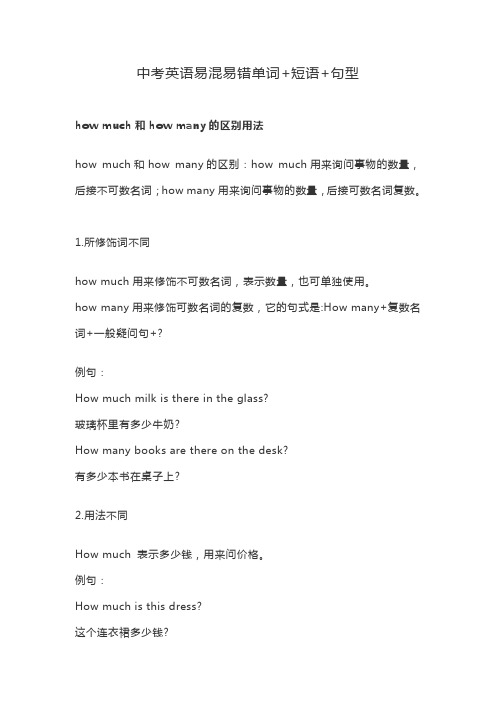
中考英语易混易错单词+短语+句型how much和how many的区别用法how much和how many的区别:how much用来询问事物的数量,后接不可数名词;how many用来询问事物的数量,后接可数名词复数。
1.所修饰词不同how much用来修饰不可数名词,表示数量,也可单独使用。
how many用来修饰可数名词的复数,它的句式是:How many+复数名词+一般疑问句+?例句:How much milk is there in the glass?玻璃杯里有多少牛奶?How many books are there on the desk?有多少本书在桌子上?2.用法不同How much 表示多少钱,用来问价格。
例句:How much is this dress?这个连衣裙多少钱?How many 表示多少,用来问数量。
例句:How many apples do you have?你有多少苹果?in和on的区别用法当我们表示某些东西被其他东西所包围时使用“in”这个词。
而“on”用于描述物体被放置在其他物体上方或外部的情况。
in可表时间,表地点,表手段、方法、材料。
on表示时间、地点、方位等。
1.意思不同in:prep.在... 里;在... 地方;在... 期间on:prep.在... 之上2.用法不同in:in着重一段时间的过程,常用于重复动作或延续动作。
in表示从现在时间算起推移到将来的一段时间之后,一般与将来时态连用。
例句:He is a layman in economics.他对经济学一窍不通。
on:表示“在物体的表面上”,只能用on的表达方式有on the next morning,on the following。
例句:The spider is walking on the ceiling.蜘蛛在天花板上爬行。
3.侧重点不同in:表示“在其中”。
on:表示“在表面”。
英语初中常用易混淆单词词组的区别用法

中考初中英语常用易混淆单词词组的区别用法英语常用易混淆单词/词组的区别用法一、how much和how many的区别用法how much和how many的区别:how much用来询问事物的数量,后接不可数名词;how many用来询问事物的数量,后接可数名词复数。
how much和how many的区别1、所修饰词不同how much用来修饰不可数名词,表示数量,也可单独使用。
how many用来修饰可数名词的复数,它的句式是:How many+复数名词+一般疑问句+?例句:How much milk is there in the glass?玻璃杯里有多少牛奶?How many books are there on the desk?有多少本书在桌子上?2、用法不同How much 表示多少钱,用来问价格。
例句:How much is this dress?这个连衣裙多少钱?How many 表示多少,用来问数量。
例句:How many apples do you have?你有多少苹果?二、in和on的区别用法当我们表示某些东西被其他东西所包围时使用“in”这个词。
而“on”用于描述物体被放置在其他物体上方或外部的情况。
in可表时间,表地点,表手段、方法、材料。
on表示时间、地点、方位等。
in和on区别一、意思不同in:prep. 在 ... 里;在 ... 地方;在 ... 期间on:prep. 在 ... 之上二、用法不同in: in着重一段时间的过程,常用于重复动作或延续动作。
in表示从现在时间算起推移到将来的一段时间之后,一般与将来时态连用。
例句:He is a layman in economics.他对经济学一窍不通。
on:表示“在物体的表面上”,只能用on的表达方式有on the next morning,on the following。
例句:The spider is walking on the ceiling.蜘蛛在天花板上爬行。
英语常用易混淆单词词组的区别用法(汇总3)
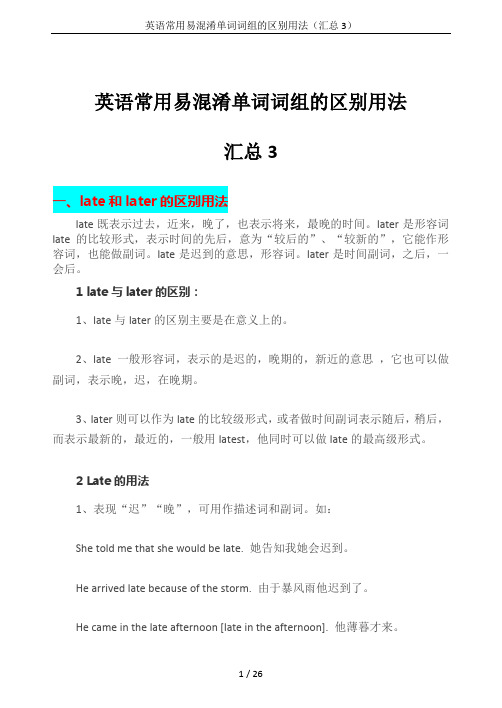
英语常用易混淆单词词组的区别用法汇总3一、late和later的区别用法late既表示过去,近来,晚了,也表示将来,最晚的时间。
later是形容词late的比较形式,表示时间的先后,意为“较后的”、“较新的”,它能作形容词,也能做副词。
late是迟到的意思,形容词。
later是时间副词,之后,一会后。
1 late与later的区别:1、late与later的区别主要是在意义上的。
2、late 一般形容词,表示的是迟的,晚期的,新近的意思,它也可以做副词,表示晚,迟,在晚期。
3、later则可以作为late的比较级形式,或者做时间副词表示随后,稍后,而表示最新的,最近的,一般用latest,他同时可以做late的最高级形式。
2 Late的用法1、表现“迟”“晚”,可用作描述词和副词。
如:She told me that she would be late. 她告知我她会迟到。
He arrived late because of the storm. 由于暴风雨他迟到了。
He came in the late afternoon [late in the afternoon]. 他薄暮才来。
留意,不要以为lately 是late 的副词情势。
2、用于be late (in) doing sth 或be late with sth, 意为“做某事做晚了或做迟了”。
如:He was late (in) getting up this morning. 明天早上他起床起得迟。
We were late with lunch [in having lunch] today. 我们明天午饭吃得迟。
比拟:be late for 意为“做……迟到”。
如:I’ve never been late for work. 我下班历来没迟到过。
Hurry up, or you’ll be late for school. 赶紧,不然你上学就要迟到了。
在翻译考试中容易混淆的英语词汇3

在翻译考试中容易混淆的英语词汇3 principal VS principle
principal:the head of a school 校长
例:The principal spoke to us today.
principle:a principle is an important fact or law. 例:The principle of democracy is important to ourcountry. stationary VS stationery
stationary:standing still 不动的、静止的。
例:Please remain stationary.
stationery:writing materials 文具、信纸。
例:They went to the store to buy some stationery uninterested VS disinterested
uninterested:指没有兴趣,索然无味,漠不关心。
例:An unterested student will not learn anything. 缺乏兴趣的学生什么都学不到。
词组:unterested attitude 漠不关心的态度
be uninterested in 对……无兴趣。
disinterested:则表示没有获得利益的动机,进而意指没有偏见,在美语中,也可以作漠不关心解
Two disinterested parties are needed to verify these documents for us. 我们需要两个公正的团体来查证这些文件。
高中英语易混淆知识点
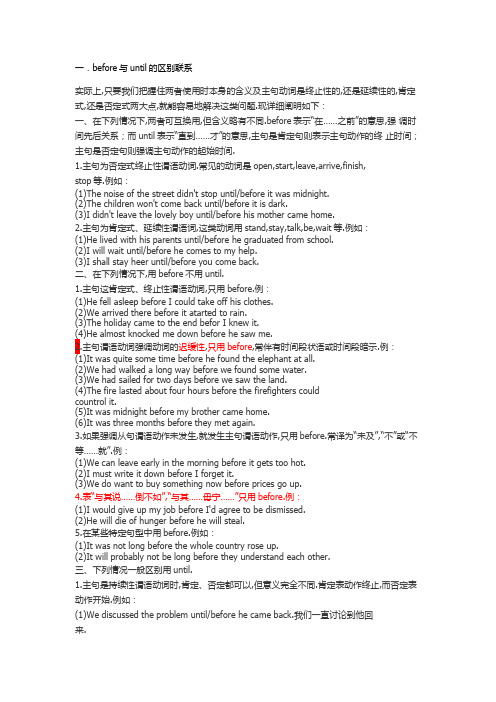
一.before与until的区别联系实际上,只要我们把握住两者使用时本身的含义及主句动词是终止性的,还是延续性的,肯定式,还是否定式两大点,就能容易地解决这类问题.现详细阐明如下:一、在下列情况下,两者可互换用,但含义略有不同.before表示“在……之前”的意思,强调时间先后关系;而until表示“直到……才”的意思,主句是肯定句则表示主句动作的终止时间;主句是否定句则强调主句动作的起始时间.1.主句为否定式终止性谓语动词.常见的动词是open,start,leave,arrive,finish,stop等.例如:(1)The noise of the street didn't stop until/before it was midnight.(2)The children won't come back until/before it is dark.(3)I didn't leave the lovely boy until/before his mother came home.2.主句为肯定式、延续性谓语词,这类动词用stand,stay,talk,be,wait等.例如:(1)He lived with his parents until/before he graduated from school.(2)I will wait until/before he comes to my help.(3)I shall stay heer until/before you come back.二、在下列情况下,用before不用until.1.主句这肯定式、终止性谓语动词,只用before.例:(1)He fell asleep before I could take off his clothes.(2)We arrived there before it atarted to rain.(3)The holiday came to the end befor I knew it.(4)He almost knocked me down before he saw me.2.主句谓语动词强调动词的迟缓性,只用before,常伴有时间段状语或时间段暗示.例:(1)It was quite some time before he found the elephant at all.(2)We had walked a long way before we found some water.(3)We had sailed for two days before we saw the land.(4)The fire lasted about four hours before the firefighters couldcountrol it.(5)It was midnight before my brother came home.(6)It was three months before they met again.3.如果强调从句谓语动作未发生,就发生主句谓语动作,只用before.常译为“未及”,“不”或“不等……就”.例:(1)We can leave early in the morning before it gets too hot.(2)I must write it down before I forget it.(3)We do want to buy something now before prices go up.4.表“与其说……倒不如”,“与其……毋宁……”只用before.例:(1)I would give up my job before I'd agree to be dismissed.(2)He will die of hunger before he will steal.5.在某些特定句型中用before.例如:(1)It was not long before the whole country rose up.(2)It will probably not be long before they understand each other.三、下列情况一般区别用until.1.主句是持续性谓语动词时,肯定、否定都可以,但意义完全不同.肯定表动作终止,而否定表动作开始.例如:(1)We discussed the problem until/before he came back.我们一直讨论到他回来.(2)We didn't discuss the problem until he came back.我们一直等到他回来后才讨论问题. 2.not…until句型尽管在某些情况下可与before互换用,但在强调句中一般仍用until.例如:(1)It was not until he told me that I knew it.(2)It was not until he finished his homework that he went home.二.as引导方式状语从句限制定语从句和非限制定语从句的区别1.方式状语从句:方式状语从句通常由as, (just) as…so…, as if, asthough引导。
容易混淆的常用动词辨析
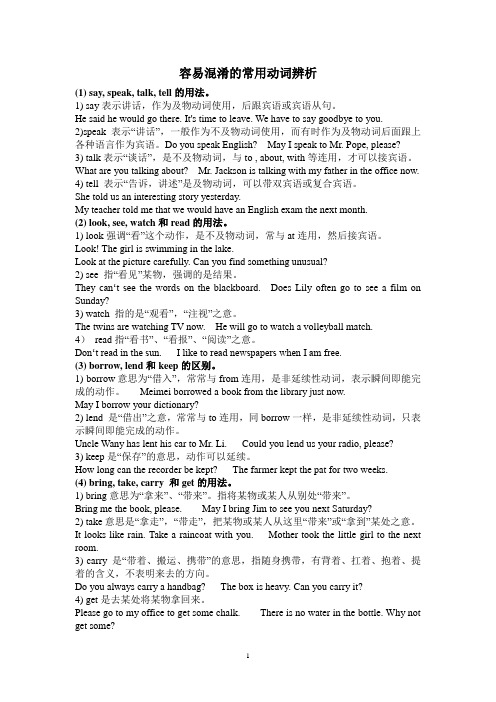
容易混淆的常用动词辨析(1) say, speak, talk, tell的用法。
1) say表示讲话,作为及物动词使用,后跟宾语或宾语从句。
He said he would go there. It's time to leave. We have to say goodbye to you.2)speak表示“讲话”,一般作为不及物动词使用,而有时作为及物动词后面跟上各种语言作为宾语。
Do you speak English? May I speak to Mr. Pope, please?3) talk表示“谈话”,是不及物动词,与to , about, with等连用,才可以接宾语。
What are you talking about? Mr. Jackson is talking with my father in the office now.4) tell 表示“告诉,讲述”是及物动词,可以带双宾语或复合宾语。
She told us an interesting story yesterday.My teacher told me that we would have an English exam the next month.(2) look, see, watch和read的用法。
1) look强调“看”这个动作,是不及物动词,常与at连用,然后接宾语。
Look! The girl is swimming in the lake.Look at the picture carefully. Can you find something unusual?2) see 指“看见”某物,强调的是结果。
They can‘t see the words on the blackboard. Does Lily often go to see a film on Sunday?3) watch 指的是“观看”,“注视”之意。
初中英语中考常用介词短语和易混易错词组
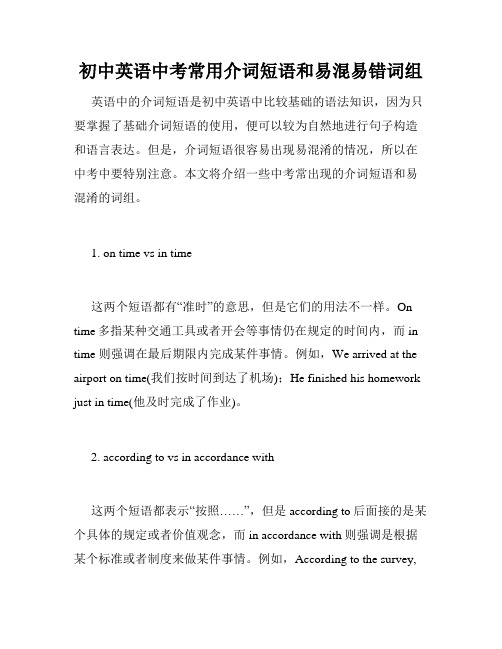
初中英语中考常用介词短语和易混易错词组英语中的介词短语是初中英语中比较基础的语法知识,因为只要掌握了基础介词短语的使用,便可以较为自然地进行句子构造和语言表达。
但是,介词短语很容易出现易混淆的情况,所以在中考中要特别注意。
本文将介绍一些中考常出现的介词短语和易混淆的词组。
1. on time vs in time这两个短语都有“准时”的意思,但是它们的用法不一样。
On time多指某种交通工具或者开会等事情仍在规定的时间内,而in time 则强调在最后期限内完成某件事情。
例如,We arrived at the airport on time(我们按时间到达了机场);He finished his homework just in time(他及时完成了作业)。
2. according to vs in accordance with这两个短语都表示“按照……”,但是according to后面接的是某个具体的规定或者价值观念,而in accordance with则强调是根据某个标准或者制度来做某件事情。
例如,According to the survey,more and more people prefer to work from home(根据调查,越来越多的人喜欢在家工作); In accordance with company regulations, smokers may only smoke in designated areas(根据公司规定,吸烟者只能在指定区域吸烟)。
3. in spite of vs despite这两个短语都表示“尽管”,但in spite of通常用来表示困难或者阻力,而despite则强调不受阻碍的情况。
例如,In spite of the heavy rain, we still went hiking(尽管下着大雨,我们还是去远足了);Despite the fact that he was tired, he continued to work(尽管很累,他还是继续工作)。
英语中容易混淆的词组
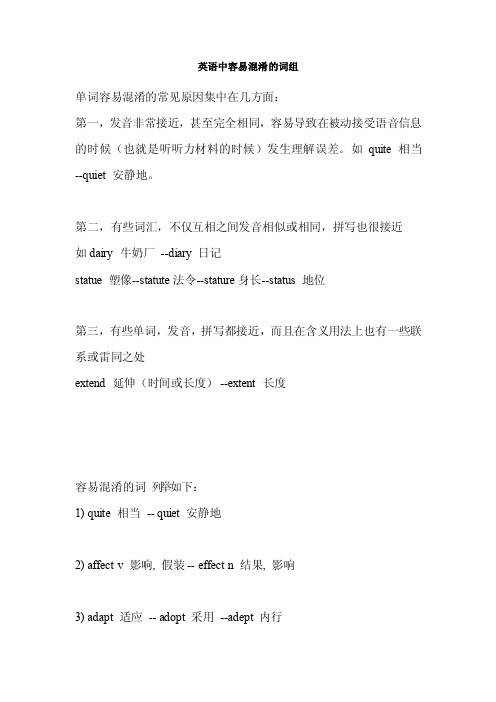
英语中容易混淆的词组单词容易混淆的常见原因集中在几方面:第一,发音非常接近,甚至完全相同,容易导致在被动接受语音信息的时候(也就是听听力材料的时候)发生理解误差。
如quite相当--quiet 安静地。
第二,有些词汇,不仅互相之间发音相似或相同,拼写也很接近如dairy牛奶厂--diary 日记statue塑像--statute法令--stature身长--status地位第三,有些单词,发音,拼写都接近,而且在含义用法上也有一些联系或雷同之处extend延伸(时间或长度) --extent长度容易混淆的词列举如下:1) quite 相当-- quiet 安静地2) affectv 影响, 假装 -- effectn 结果, 影响3) adapt 适应-- adopt 采用--adept 内行4) angel 天使--angle 角度5) dairy 牛奶厂--diary 日记6) contend奋斗, 斗争--content内容, 满足的context上下文--contest竞争, 比赛7) princip al 校长, 主要的 --princip le 原则8) implici t 含蓄的 --explici t 明白的9) dessert甜食 --desert沙漠v 放弃--dissert写论文10) pat 轻拍--tap 轻打--slap 掌击-rap 敲,打11) decent正经的 --descent n 向下, 血统 --descend v 向下12) sweet 甜的--sweat 汗水13) later 后来-- latter后者 --latest最近的 --latelyadv 最近14) costume服装 --custom习惯15) extensi ve 广泛的 --intensi ve 深刻的16) aural 耳的--oral 口头的17) abroad国外 --aboard上(船,飞机)18) altar 祭坛--alter 改变19) assent同意 --ascent上升 --accent口音20) champio n 冠军 --champag ne 香槟酒-- campaig n 战役21) baron 男爵--barren不毛之地的--barn 古仓22) beam 梁,光束--bean 豆--been have 过去式23) precede领先 --proceed进行,继续24) pray 祈祷--prey 猎物25) chicken鸡 --kitchen厨房26) monkey猴子-- donkey驴27) chore 家务活--chord 和弦-- cord 细绳28) cite 引用--site 场所--sight 视觉29) clash (金属)幢击声--crash 碰幢,坠落--crush 压坏30) complim ent 赞美 --complem ent 附加物31) confirm确认 --conform使顺从32) contact接触-- contrac t 合同 --contras t 对照33) council议会--counsel忠告 --consul领事34) crow 乌鸦--crown 王冠--clown 小丑--cow 牛35) dose 一剂药--doze 打盹36) drawn draw 过去分词--drown 溺水37) emigran t 移民到国--immigra nt 从某国来的移民38) excessn 超过--exceedv超过--excel 擅长39) hotel 青年旅社--hostel旅店40) latitud e 纬度--altitud e 高度--gratitu de 感激41) immoral不道德的 --immorta l 不朽的42) lone 孤独的--alone 单独的--lonely寂寞的43) mortal不死的--metal 金属--mental神经的medal勋章--model 模特--meddle玩弄44) scare 惊吓--scarce缺乏的45) drought天旱 --draught通风, 拖拉 --draught s (英)国际跳棋47) assure保证-ensure使确定--insure保险48) except除外--expect期望--accept接受--excerpt选录--exempt免除49) floor 地板--flour 面粉50) inciden t 事件--acciden t 意外51) inspira tion 灵感 --aspirat ion 渴望52) march 三月, 前进--match 比赛53) patent专利 --potent有力的--potenti al 潜在的54) police警察--policy政策--politic s 政治55) protest抗议--protect保护56) require需要 --inquire询问 --enquire询问 --acquire获得67) revenge报仇--avenge为...报仇68) story 故事 --storey楼层--store 商店69) strike打--stick 坚持-- strict严格的70) expand扩张 --expend花费--extend延长71) commerc e 商业 --commenc e 开始72) through通过--thoroug h 彻底的--(al)though尽管--thought think 过去分词73) purpose目的 --suppose假设 --propose建议74) expect期望--respect尊敬-- aspect方面-- inspect视察--suspect 怀疑75) glide 滑翔--slide 使滑行--slip 跌落76) steal 偷--steel 钢77) strive努力--stride大步走78) allusio n 暗示 --illusio n 幻觉--delusio n 错觉 --elusion逃避79) prospec t 前景 --perspec tive 透视法80) station ery 文具--station ary 固定的81) loose 松的--lose 丢失-- loss n 损失-- lost lose过去式82) amend 改正, 修正--emend 校正83) amoralunmoral immoral同义不道德的84) capitol大厦--capital首都85) casual随便的--causal表原因的86) extend延伸 --extent长度 --extant现存的87) inabili ty 没能力--disabil ity 残疾88) personn el 人事--persona l 个人的89) statue塑像--statute法令--stature身长 ---status地位90) widow 寡妇 --window窗户91) socks 短袜 --stockin gs 长筒袜92) tax 税--taxi 出租93) definit e 不定的 --infinit e 无限的94) grim 严酷的--grime 污点95) crayon蜡笔 --canyon山谷96) recent最近--resent生气97) phrase短语--phase 阶段98) mission使命--emissio n 散发, 发射--mansion大厦99) vision视觉 --version译本100) gasp 上气不接下气--grasp 抓住。
中考英语之易混淆词汇知识点辨析
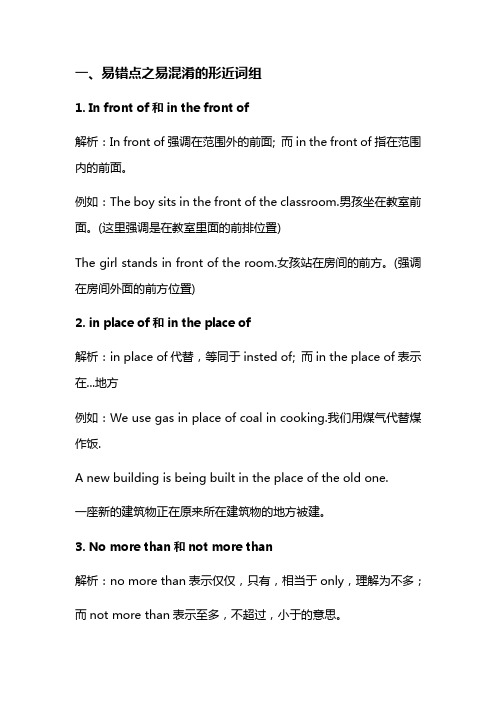
一、易错点之易混淆的形近词组1.In front of和in the front of解析:In front of强调在范围外的前面; 而in the front of指在范围内的前面。
例如:The boy sits in the front of the classroom.男孩坐在教室前面。
(这里强调是在教室里面的前排位置)The girl stands in front of the room.女孩站在房间的前方。
(强调在房间外面的前方位置)2.in place of和in the place of解析:in place of代替,等同于insted of; 而in the place of表示在...地方例如:We use gas in place of coal in cooking.我们用煤气代替煤作饭.A new building is being built in the place of the old one.一座新的建筑物正在原来所在建筑物的地方被建。
3.No more than和not more than解析:no more than表示仅仅,只有,相当于only,理解为不多;而not more than表示至多,不超过,小于的意思。
例如:He is no more than an ordinary English teacher. 他只不过是个普通的英文老师。
He has not more than three children. 他最多3 个孩子(有或许还不到三个)4.On earth和on the earth解析:两者都有在地上,在地球上的意思,但on earth还有到底,究竟的意思;On the earth只是单纯的表示在地上,在地球上例如:where on earth did you spring from?你究竟从哪里冒出来的?What if there was no lead on the earth at all?如果地球上根本就没有铅这种物质怎么办?5.At all和after all解析:at all表示根本,全然的意思,常用短语not at all表示一点也不;after all表示到底,毕竟的意思例如:I don't know him at all. 我根本不认识他。
中考英语常用易混淆单词词组的区别用法详解
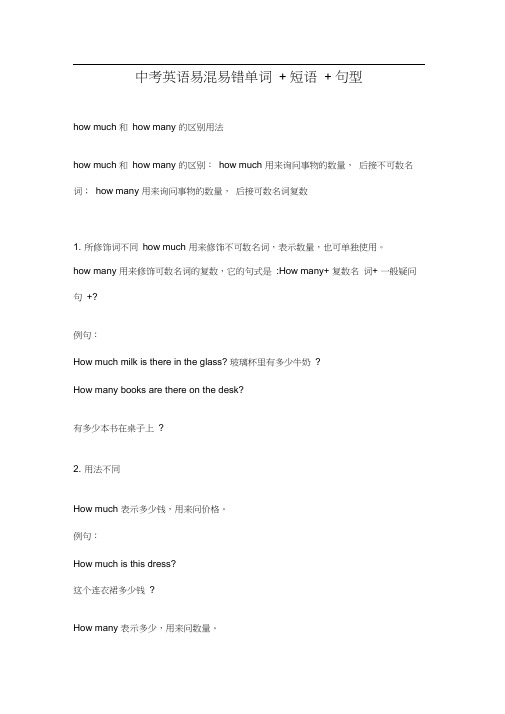
中考英语易混易错单词+ 短语+ 句型how much 和how many 的区别用法how much 和how many 的区别:how much 用来询问事物的数量,后接不可数名词;how many 用来询问事物的数量,后接可数名词复数1. 所修饰词不同how much 用来修饰不可数名词,表示数量,也可单独使用。
how many 用来修饰可数名词的复数,它的句式是:How many+ 复数名词+ 一般疑问句+?例句:How much milk is there in the glass? 玻璃杯里有多少牛奶?How many books are there on the desk?有多少本书在桌子上?2. 用法不同How much 表示多少钱,用来问价格。
例句:How much is this dress?这个连衣裙多少钱?How many 表示多少,用来问数量。
例句:How many apples do you have?你有多少苹果?in 和on 的区别用法当我们表示某些东西被其他东西所包围时使用“ in ”这个词。
而“ on 用于描述物体被放置在其他物体上方或外部的情况。
in 可表时间,表地点,表手段、方法、材料。
on 表示时间、地点、方位等。
1. 意思不同in :prep. 在... 里;在... 地方;在... 期间on :prep. 在... 之上2. 用法不同in :in 着重一段时间的过程,常用于重复动作或延续动作。
in 表示从现在时间算起推移到将来的一段时间之后,一般与将来时态连用。
例句:He is a layman in economics.他对经济学一窍不通on :表示“在物体的表面上”,只能用on 的表达方式有on the next morning ,on the following 。
例句:The spider is walking on the ceiling.蜘蛛在天花板上爬行。
2022-2023学年中考英语常见易混单词短语用法辨析(三)
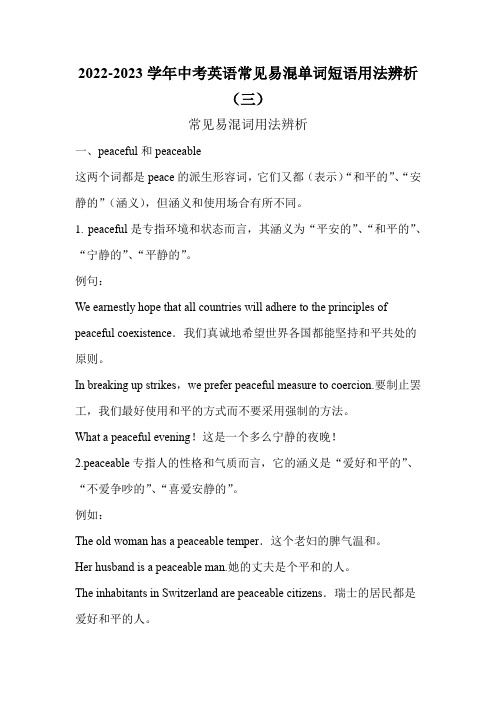
2022-2023学年中考英语常见易混单词短语用法辨析(三)常见易混词用法辨析一、peaceful和peaceable这两个词都是peace的派生形容词,它们又都(表示)“和平的”、“安静的”(涵义),但涵义和使用场合有所不同。
1.peaceful是专指环境和状态而言,其涵义为“平安的”、“和平的”、“宁静的”、“平静的”。
例句:We earnestly hope that all countries will adhere to the principles of peaceful coexistence.我们真诚地希望世界各国都能坚持和平共处的原则。
In breaking up strikes,we prefer peaceful measure to coercion.要制止罢工,我们最好使用和平的方式而不要采用强制的方法。
What a peaceful evening!这是一个多么宁静的夜晚!2.peaceable专指人的性格和气质而言,它的涵义是“爱好和平的”、“不爱争吵的”、“喜爱安静的”。
例如:The old woman has a peaceable temper.这个老妇的脾气温和。
Her husband is a peaceable man.她的丈夫是个平和的人。
The inhabitants in Switzerland are peaceable citizens.瑞士的居民都是爱好和平的人。
二、out of question和out of the question这一对片语仅差一字之微,涵义却大相径庭。
1.out of question的意思是“毫无疑问”,它是副词性短语,修饰谓语动词或整个句子。
其义相当于beyond question,beyond doubt。
例句:The general trend of the situation in Bosnia is out of question,developing in a direction more favourable to peace.毫无疑问,波斯尼亚形势的总趋势是朝着更加有利于和平的方向发展。
初中英语相似(易混)短语辨析
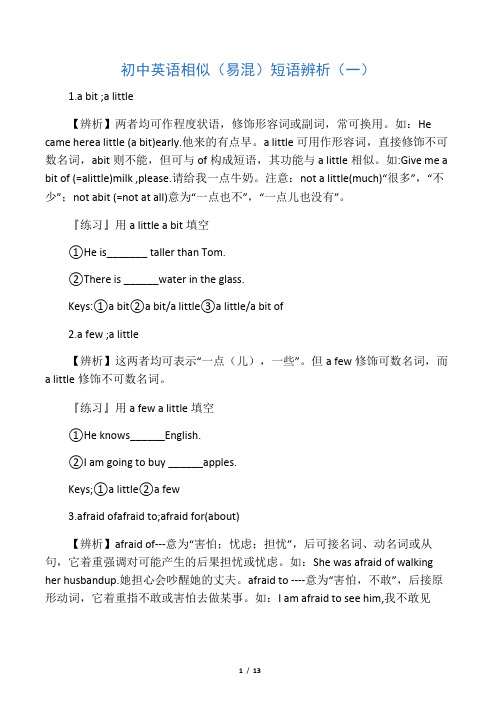
初中英语相似(易混)短语辨析(一)1.a bit ;a little【辨析】两者均可作程度状语,修饰形容词或副词,常可换用。
如:He came herea little (a bit)early.他来的有点早。
a little可用作形容词,直接修饰不可数名词,abit则不能,但可与of构成短语,其功能与a little相似。
如:Give me a bit of (=alittle)milk ,please.请给我一点牛奶。
注意:not a little(much)“很多”,“不少”;not abit (=not at all)意为“一点也不”,“一点儿也没有”。
『练习』用a little a bit填空①He is_______ taller than Tom.②There is ______water in the glass.Keys:①a bit②a bit/a little③a little/a bit of2.a few ;a little【辨析】这两者均可表示“一点(儿),一些”。
但a few修饰可数名词,而a little修饰不可数名词。
『练习』用a few a little填空①He knows______English.②I am going to buy ______apples.Keys;①a little②a few3.afraid ofafraid to;afraid for(about)【辨析】afraid of---意为“害怕;忧虑;担忧”,后可接名词、动名词或从句,它着重强调对可能产生的后果担忧或忧虑。
如:She was afraid of walking her husbandup.她担心会吵醒她的丈夫。
afraid to ----意为“害怕,不敢”,后接原形动词,它着重指不敢或害怕去做某事。
如:I am afraid to see him,我不敢见他。
afraid for (about)意为“替某人(事)担心”,其后接人或事。
常见易混淆英语语法

so+形容词+(a/an/the)+单数名词/复数名词宇文皓月such+(a/an/the)+形容词+单数名词/复数名词【The weather is so nice that all of us want to go to the park.】such+adj. such为形容词【It's such nice weather that all of us want to go to the park.】such+adj.+不成数名词或复数可数名词+thatsuch+a/an+adj.+单数可数名词+that=so+adj.+a/an+单数可数名词+that【Mike is such an honest worker that we all believe him.】=【Mike is so honest a worker that we all beleve him.】一句话,so后面直接跟形容词,后面+that再+名词。
such后面加形容词后+名词再加that最明显的区别就是用法分歧:so+形容词+(a/an/the)+单数名词/复数名词such+(a/an/the)+形容词+单数名词/复数名词so副词,意思是“如此、这样”,后面常接形容词或副词;such 形容词,意思是“如此、这样”,修饰名词,即可接可数名词,也可以接不成数名词。
例如:It’s such a fine day.It’s so fine a day.从上面两例可以看出:such修饰单数可数名词时,不定冠词a/an通常放在such之后紧挨着;而so则分歧,不定冠词位置分歧。
其结构分别为:such a/ an +形容词+单数可数名词;so +形容词+a/an+单数名词。
such除了修饰单数可数名词外,还可以修饰复数名词和不成数名词,so是副词,修饰形容词或副词。
如果复数名词前有few,many等形容词;不成数名词前有little,much等形容词,就必须用so,而不克不及用such,例如:The camel had such a long neck. 骆驼长着那样长的脖子。
英语常用易混淆单词词组的区别用法(9组)
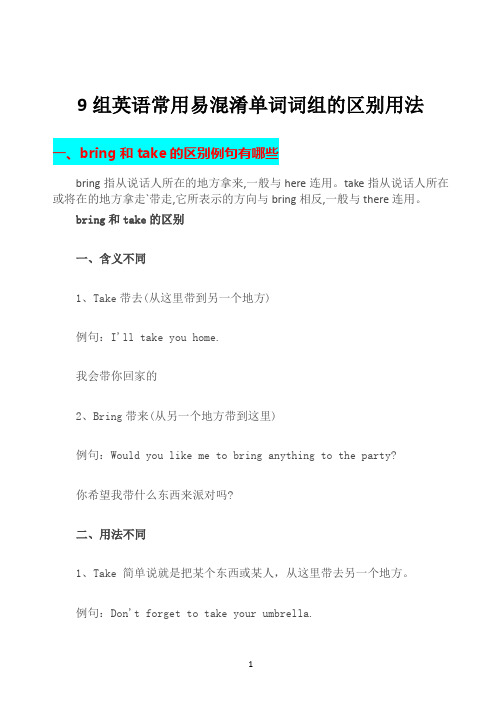
9组英语常用易混淆单词词组的区别用法一、bring和take的区别例句有哪些bring指从说话人所在的地方拿来,一般与here连用。
take指从说话人所在或将在的地方拿走`带走,它所表示的方向与bring相反,一般与there连用。
bring和take的区别一、含义不同1、Take带去(从这里带到另一个地方)例句:I'll take you home.我会带你回家的2、Bring带来(从另一个地方带到这里)例句:Would you like me to bring anything to the party?你希望我带什么东西来派对吗?二、用法不同1、Take 简单说就是把某个东西或某人,从这里带去另一个地方。
例句:Don't forget to take your umbrella.别忘记带走你的伞。
2、Bring 简单说就是把某个东西,从另一个地方带来这里。
例句:Would you like me to bring anything to the party?你希望我带什么东西来派对吗?三、主动性不同1、take可以表示主动的移动。
例句:I'm taking the kids to the cinema tonight.今晚我要带孩子们去看电影。
2、bring则表示跟随一起移动。
例句:Would you like to come with usand bring Susie?你愿意和我们带上苏西跟我们去吗?二、anybody和anyone的区别及用法anybody和anyone相同处是都可以指人,”任何人",或疑问句否定句的的 "某个人"。
不同处是 anybody只能指人,而anyone,还可指别的, "任何一个" "某一个"。
1 anybody和anyone的区别1、Anyone表示单数,单人。
表示特定对象为多人中的单个人。
英语中易混词和词组辨析

一易混词和词组辨析1.Civil civilian civilized civicCivil是“公民的;平民的;文明的;有礼貌的”;civilian是“未服役的;平民的;平民”;civilized是“使教化,开化;受教育的”;civic是“市民的;公民的;市政的”。
2.Presume assume resume consumePresume是“以为;认定;推测;假定(为真实)”;assume是“(在未证实之前)假定;以为;假装”;resume 是“停顿一段时间后再继续;重新开始;恢复”;consume是“用尽;耗尽;被火或因浪费而毁灭”。
3.Relish abolish cherish finishRelish是“享受;爱好;喜好”;abolish是“废止;废除;革除(战争、旧习俗)”;cherish是“心中怀着;珍爱;抚爱”;finish是“结束,完成”。
4.Multitude altitude latitude attitudeMultitude是“大量”;altitude是“高度”;latitude是“纬度”;attitude是“态度”。
5.Original initial precedent preliminaryOriginal是“最初的,原先的”,也可用作名词指原物,原作;initial是“开始的;第一的”;precedent是“先例;惯例”;preliminary是“开端的;预备性的”。
6.Integrated facilitated rectified activatedIntegrated是“使变成一体,使结合在一起”,常和with或into搭配;facilitated是“使变得容易,使便利”;rectified是“纠正;修复”;activated是“使活动起来;使开始起作用”。
7.Enforce enhance endow entailenforce是“实施,执行”;enhance是“提高(质量、价值、吸引力等);增加,增强,增进”;endow是“给予,赋予;认为......具有某种特征;资助,捐赠”;entail是“使人承担;使成为必要,需要”。
中考英语易混易错单词+短语+句型,全
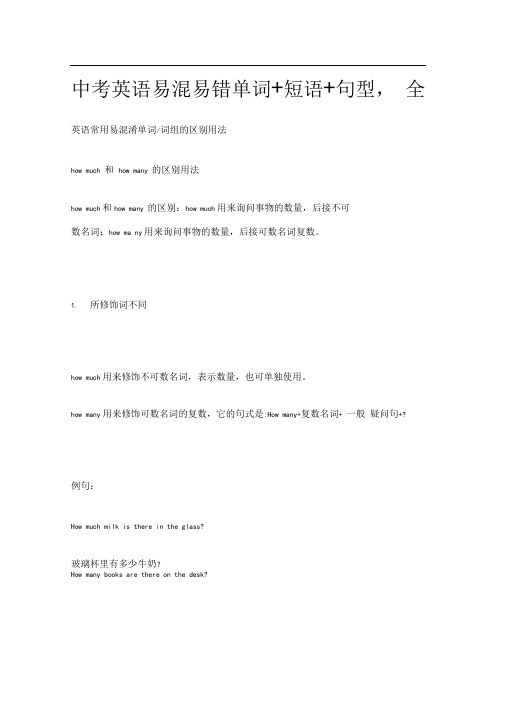
中考英语易混易错单词+短语+句型,全英语常用易混淆单词/词组的区别用法how much 和how many 的区别用法how much和how many 的区别:how much用来询问事物的数量,后接不可数名词;how ma ny用来询问事物的数量,后接可数名词复数。
1.所修饰词不同how much用来修饰不可数名词,表示数量,也可单独使用。
how many用来修饰可数名词的复数,它的句式是:How many+复数名词+ 一般疑问句+?例句:How much milk is there in the glass?玻璃杯里有多少牛奶?How many books are there on the desk?有多少本书在桌子上?2.用法不同How much 表示多少钱,用来问价格例句:How much is this dress?这个连衣裙多少钱?How many 表示多少,用来问数量。
例句:How many apples do you have?你有多少苹果?in和on的区别用法当我们表示某些东西被其他东西所包围时使用“in ”这个词。
而“ on ”用于描述物体被放置在其他物体上方或外部的情况。
in可表时间,表地点,表手段、方法、材料。
on表示时间、地点、方位等。
1.意思不同in : prep.在…里;在…地方;在…期间on : prep.在... 之上2.用法不同in : in着重一段时间的过程,常用于重复动作或延续动作。
in表示从现在时间算起推移到将来的一段时间之后,一般与将来时态连用。
例句:He is a layma n in econo mics.他对经济学一窍不通on :表示“在物体的表面上”,只能用on的表达方式有on the next morningon the followi ng 。
”,可换用, 例句:The spider is walking on the ceiling.蜘蛛在天花板上爬行。
大学英语四六级易混淆的单词(上)
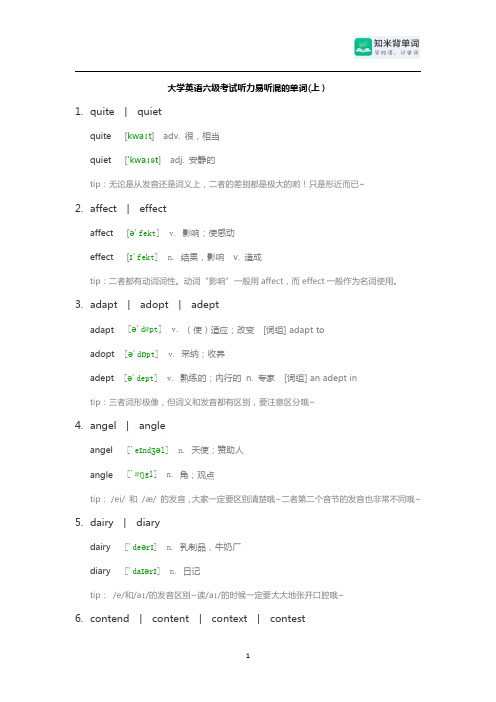
大学英语六级考试听力易听混的单词(上)1.quite|quietquite[kwaɪt]adv.很,相当quiet['kwaɪət]adj.安静的tip:无论是从发音还是词义上,二者的差别都是极大的哟!只是形近而已~2.affect|effectaffect[ə'fekt]v.影响;使感动effect[ɪ'fekt]n.结果,影响v.造成tip:二者都有动词词性。
动词“影响”一般用affect,而effect一般作为名词使用。
3.adapt|adopt|adeptadapt[ə'dæpt]v.(使)适应;改变[词组]adapt toadopt[ə'dɒpt]v.采纳;收养adept[ə'dept]v.熟练的;内行的n.专家[词组]an adept intip:三者词形极像,但词义和发音都有区别,要注意区分哦~4.angel|angleangel['eɪndʒəl]n.天使;赞助人angle['æŋgl]n.角;观点tip:/ei/和/æ/的发音,大家一定要区别清楚哦~二者第二个音节的发音也非常不同哦~ 5.dairy|diarydairy['deərɪ]n.乳制品,牛奶厂diary['daɪərɪ]n.日记tip:/e/和/aɪ/的发音区别~读/aɪ/的时候一定要大大地张开口腔哦~6.contend|content|context|contestcontend[kən'tend]v.奋斗;斗争;声称content['kɒntent]n.内容,要旨adj.满足的context['kɒntekst]n.上下文,背景,语境contest['kɒntest]n./v.竞赛,争论tip:巧记方法:con-有“聚众、一起”的意思,tend是“走向、倾向”,一起倾向就是“声称”;tent是帐篷,一起帐篷具有“空间”的含义,因此是“容量、内容”;text是文本,一堆文本就是“语境、上下文”;test是比赛,一起比赛就是“竞赛、争论”啦!7.principal|principleprincipal['prɪnsəpl]n.校长adj.主要的,重要的principle['prɪnsəpl]n.原则;原理;信条tip:二者的发音倒是没啥区别,但注意拼写哦,一个是pal,一个是ple~8.implicit|explicitimplicit[ɪm'plɪsɪt]n.暗示的;含蓄的explicit[ɪk'splɪsɪt]n.明确的;清楚的;详尽的tip:二者互为反义词。
高中极易混淆英语单词与介词用法总结
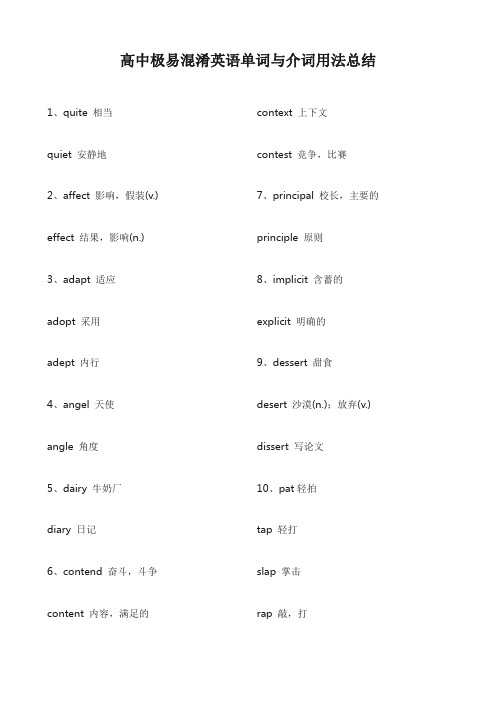
高中极易混淆英语单词与介词用法总结1、quite 相当quiet 安静地2、affect 影响,假装(v.) effect 结果,影响(n.)3、adapt 适应adopt 采用adept 内行4、angel 天使angle 角度5、dairy 牛奶厂diary 日记6、contend 奋斗,斗争content 内容,满足的context 上下文contest 竞争,比赛7、principal 校长,主要的principle 原则8、implicit 含蓄的explicit 明确的9、dessert 甜食desert 沙漠(n.);放弃(v.) dissert 写论文10、pat轻拍tap 轻打slap 掌击rap 敲,打11、decent 正经的descent 向下,血统(n.) descend 向下(v.) 12、sweet 甜的sweat 汗水13、later 后来latter 后者的latest 最近的lately 最近(adv.)14、costume 服装custom习惯15、extensive 广泛的intensive 集中的16、aural 听觉的oral 口头的17、abroad 国外aboard 上(船,飞机) 18、altar 祭坛(n.) alter 改变(v.)19、assent 同意ascent 上升accent 口音20、champion 冠军champagne 香槟酒campaign 战役21、baron 男爵barren 不毛之地的barn 古仓22、beam 梁,光束bean 豆been be的过去式23、precede 领先proceed 进行,继续24、pray 祈祷prey 猎物25、chicken 鸡kitchen 厨房26、monkey 猴子donkey 驴27、chore 家务活chord 和弦cord 细绳28、cite 引用site 场所sight 视觉29、clash (金属)撞击声crash 撞碎,坠落crush 压30、compliment 赞美complement 补足,补充物31、confirm 确认conform 使顺从32、contact 接触contract 合同contrast 对照33、council 议会counsel 忠告consul 领事34、crow 乌鸦crown 王冠clown 小丑cow 牛35、dose 一剂药doze 打盹36、drawn draw的过去分词drown 溺水37、rude 粗鲁的crude 天然的38、source 来源,水源sauce 酱油saucer 茶39、vocation 职业vacation 假期evocation 唤起revoation 撤回40、resource资源recourse救援41、emigrant 移民到国外(迁出)immigrant 从某国来的移民(迁入)42、immoral 不道德的immortal 不朽的43、except 除外expect 期望accept 接受excerpt 摘录44、floor 地板flour 面粉45、incident 事件accident 意外46、inspection 检查aspiration 渴望47、patent 专利potent 强有力的potential 潜在的48、assume 假定resume 简历,重新开始49、require 需要inquire 询问enquire 打听acquire 获得50、story 故事storey 楼层store 商店51、protest 抗议protect 保护52、strike 攻击stick 容忍,粘贴strict 严格的53、expand 扩张expend 花费extend 延长54、commerce 商业commence 开始55、through 通过thorough 彻底的though 尽管thought think过去分词56、purpose 目的suppose 假设propose 建议57、allusion 暗示illusion 幻觉delusion 错觉elusion 逃避58、prospect 前景perspective 透视59、stationery 文具stationary 固定的60、strive 努力stride 大步走61、police 警察policy 政策politics 政治62、revenge 报仇avenge 替……报仇63、resemble类似assemble 集合,装配(v.) assembly 集合,装配(n.)64、glide 滑翔slide 使滑行slip 跌落65、amend 改正,修正emend 修订66、attain 达到obtain 获得abstain 放弃67、casual 随便的causal 具有因果关系的68、extent 长度extant 现存的69、grim 冷酷的grime 污点70、award 授予reward 奖赏71、definite 确切的infinite 无限的72、crayon 蜡笔canyon 山谷73、recent 最近resent 愤怒74、mission 使命emission 散发,发射mansion 大厦75、vision 视觉version 译本76、phrase 短语phase 阶段77、idle 空闲的idol 偶像78、induce 诱导deduce 推测reduce 减少seduce 诱使79、lapse 流逝elapse 消逝eclipse 日食80、bride 新娘bribe 贿赂英语介词用法归纳总结常用介词基本用法辨析表示方位的介词:in, to, on1. in 表示在某地范围之内。
- 1、下载文档前请自行甄别文档内容的完整性,平台不提供额外的编辑、内容补充、找答案等附加服务。
- 2、"仅部分预览"的文档,不可在线预览部分如存在完整性等问题,可反馈申请退款(可完整预览的文档不适用该条件!)。
- 3、如文档侵犯您的权益,请联系客服反馈,我们会尽快为您处理(人工客服工作时间:9:00-18:30)。
英语中容易混淆的词组
单词容易混淆的常见原因集中在几方面:
第一,发音非常接近,甚至完全相同,容易导致在被动接受语音信息的时候(也就是听听力材料的时候)发生理解误差。
如quite 相当--quiet 安静地。
第二,有些词汇,不仅互相之间发音相似或相同,拼写也很接近
如dairy 牛奶厂--diary 日记
statue 塑像--statute法令--stature身长--status 地位
第三,有些单词,发音,拼写都接近,而且在含义用法上也有一些联系或雷同之处
extend 延伸(时间或长度)--extent 长度
容易混淆的词列举如下:
1) quite 相当-- quiet 安静地
2) affect v 影响, 假装-- effect n 结果, 影响
3) adapt 适应-- adopt 采用--adept 内行
4) angel 天使--angle 角度
5) dairy 牛奶厂--diary 日记
6) contend 奋斗, 斗争--content 内容, 满足的
context 上下文--contest 竞争, 比赛
7) principal 校长, 主要的--principle 原则
8) implicit 含蓄的--explicit 明白的
9) dessert 甜食--desert 沙漠v 放弃--dissert 写论文
10) pat 轻拍--tap 轻打--slap 掌击-rap 敲,打
11) decent 正经的--descent n 向下, 血统--descend v 向下
12) sweet 甜的--sweat 汗水
13) later 后来-- latter 后者--latest 最近的--lately adv 最近
14) costume 服装--custom 习惯
15) extensive 广泛的--intensive 深刻的
16) aural 耳的--oral 口头的
17) abroad 国外--aboard 上(船,飞机)
18) altar 祭坛--alter 改变
19) assent 同意--ascent 上升--accent 口音
20) champion 冠军--champagne 香槟酒-- campaign 战役
21) baron 男爵--barren 不毛之地的--barn 古仓
22) beam 梁,光束--bean 豆--been have 过去式
23) precede 领先--proceed 进行,继续
24) pray 祈祷--prey 猎物
25) chicken 鸡--kitchen 厨房
26) monkey 猴子-- donkey 驴
27) chore 家务活--chord 和弦-- cord 细绳
28) cite 引用--site 场所--sight 视觉
29) clash (金属)幢击声--crash 碰幢,坠落--crush 压坏
30) compliment 赞美--complement 附加物
31) confirm 确认--conform 使顺从
32) contact 接触-- contract 合同--contrast 对照
33) council 议会--counsel 忠告--consul 领事
34) crow 乌鸦--crown 王冠--clown 小丑--cow 牛
35) dose 一剂药--doze 打盹
36) drawn draw 过去分词--drown 溺水
37) emigrant 移民到国--immigrant 从某国来的移民
38) excess n 超过--exceed v超过--excel 擅长
39) hotel 青年旅社--hostel 旅店
40) latitude 纬度--altitude 高度--gratitude 感激
41) immoral 不道德的--immortal 不朽的
42) lone 孤独的--alone 单独的--lonely 寂寞的
43) mortal 不死的--metal 金属--mental 神经的medal勋章--model 模特--meddle 玩弄
44) scare 惊吓--scarce 缺乏的
45) drought 天旱--draught 通风, 拖拉--draughts (英)国际跳棋
47) assure 保证-ensure 使确定--insure 保险
48) except 除外--expect 期望--accept 接受--excerpt 选录--exempt 免除
49) floor 地板--flour 面粉
50) incident 事件--accident 意外
51) inspiration 灵感--aspiration 渴望
52) march 三月, 前进--match 比赛
53) patent 专利--potent 有力的--potential 潜在的
54) police 警察--policy 政策--politics 政治
55) protest 抗议--protect 保护
56) require 需要--inquire 询问--enquire 询问--acquire 获得
67) revenge 报仇--avenge 为...报仇
68) story 故事--storey 楼层--store 商店
69) strike 打--stick 坚持-- strict 严格的
70) expand 扩张--expend 花费--extend 延长
71) commerce 商业--commence 开始
72) through 通过--thorough 彻底的--(al)though 尽管--thought think 过去分词
73) purpose 目的--suppose 假设--propose 建议
74) expect 期望--respect 尊敬-- aspect 方面-- inspect 视察--suspect 怀疑
75) glide 滑翔--slide 使滑行--slip 跌落
76) steal 偷--steel 钢
77) strive 努力--stride 大步走
78) allusion 暗示--illusion 幻觉--delusion 错觉--elusion 逃避
79) prospect 前景--perspective 透视法
80) stationery 文具--stationary 固定的
81) loose 松的--lose 丢失-- loss n 损失-- lost lose过去式
82) amend 改正, 修正--emend 校正
83) amoral unmoral immoral 同义不道德的
84) capitol 大厦--capital 首都
85) casual 随便的--causal 表原因的
86) extend 延伸--extent 长度--extant 现存的
87) inability 没能力--disability 残疾
88) personnel 人事--personal 个人的
89) statue 塑像--statute 法令--stature 身长---status 地位
90) widow 寡妇--window 窗户
91) socks 短袜--stockings 长筒袜
92) tax 税--taxi 出租
93) definite 不定的--infinite 无限的
94) grim 严酷的--grime 污点
95) crayon 蜡笔--canyon 山谷
96) recent 最近--resent 生气
97) phrase 短语--phase 阶段
98) mission 使命--emission 散发, 发射--mansion 大厦
99) vision 视觉--version 译本
100) gasp 上气不接下气--grasp 抓住。
